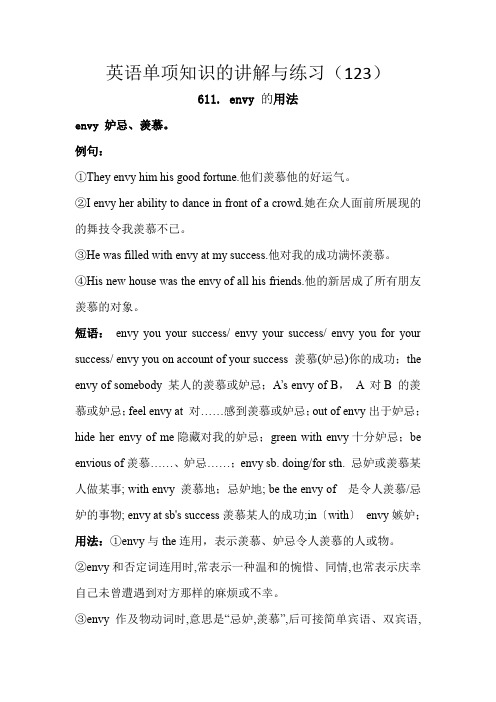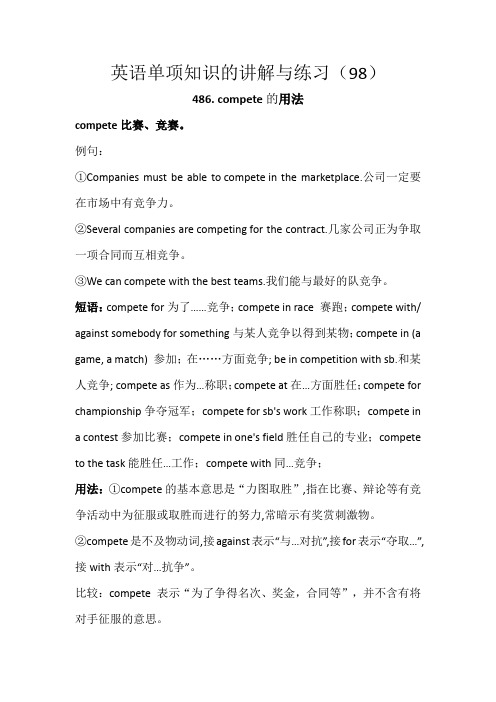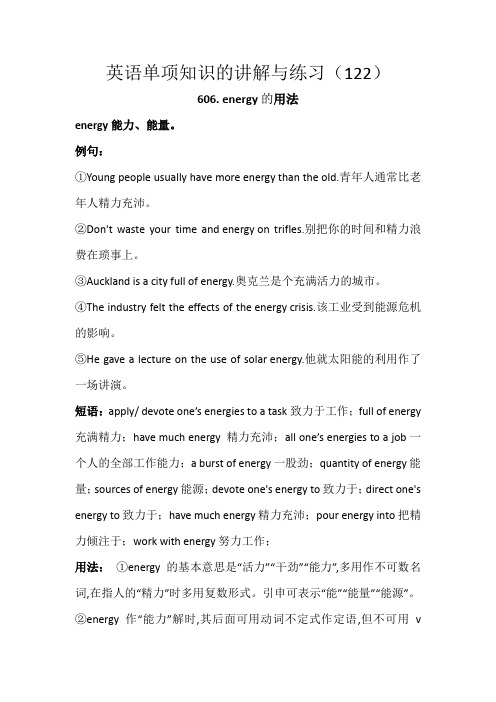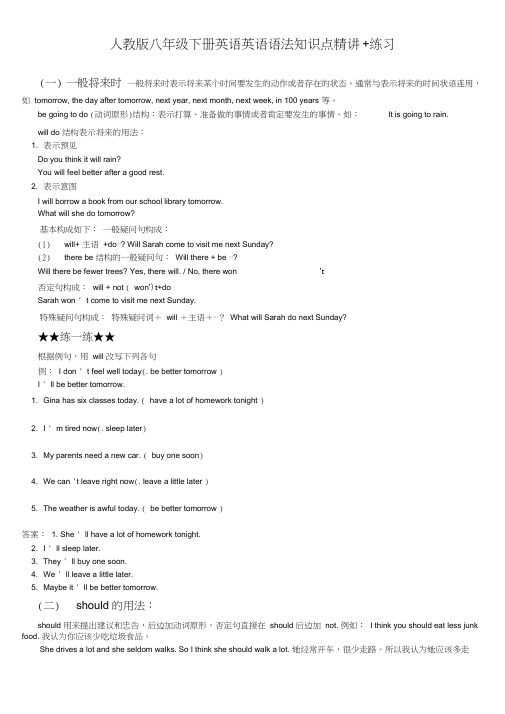英语单项知识的讲解与练习(112)
- 格式:docx
- 大小:22.78 KB
- 文档页数:9

英语单项知识的讲解与练习(123)611. envy 的用法envy 妒忌、羡慕。
例句:①They envy him his good fortune.他们羡慕他的好运气。
②I envy her ability to dance in front of a crowd.她在众人面前所展现的的舞技令我羡慕不已。
③He was filled with envy at my success.他对我的成功满怀羡慕。
④His new house was the envy of all his friends.他的新居成了所有朋友羡慕的对象。
短语:envy you your success/ envy your success/ envy you for your success/ envy you on account of your success 羡慕(妒忌)你的成功;the envy of somebody 某人的羡慕或妒忌;A’s envy of B,A 对B 的羡慕或妒忌;feel envy at 对……感到羡慕或妒忌;out of envy出于妒忌;hide her envy of me隐藏对我的妒忌;green with envy十分妒忌;be envious of羡慕……、妒忌……;envy sb. doing/for sth. 忌妒或羡慕某人做某事; with envy 羡慕地;忌妒地; be the envy of 是令人羡慕/忌妒的事物; envy at sb's success 羡慕某人的成功;in〔with〕envy 嫉妒;用法:①envy与the连用,表示羡慕、妒忌令人羡慕的人或物。
②envy和否定词连用时,常表示一种温和的惋惜、同情,也常表示庆幸自己未曾遭遇到对方那样的麻烦或不幸。
③envy作及物动词时,意思是“忌妒,羡慕”,后可接简单宾语、双宾语,也可以在宾语后接for加动名词等结构,但不能接从句。

英语单项知识的讲解与练习(98)486. compete的用法compete比赛、竞赛。
例句:①Companies must be able to compete in the marketplace.公司一定要在市场中有竞争力。
②Several companies are competing for the contract.几家公司正为争取一项合同而互相竞争。
③We can compete with the best teams.我们能与最好的队竞争。
短语:compete for为了……竞争;compete in race 赛跑;compete with/ against somebody for something与某人竞争以得到某物;compete in (a game, a match) 参加;在……方面竞争; be in competition with sb.和某人竞争; compete as 作为…称职;compete at 在…方面胜任;compete for championship 争夺冠军;compete for sb's work 工作称职;compete in a contest 参加比赛;compete in one's field 胜任自己的专业;compete to the task 能胜任…工作;compete with 同…竞争;用法:①compete的基本意思是“力图取胜”,指在比赛、辩论等有竞争活动中为征服或取胜而进行的努力,常暗示有奖赏刺激物。
②compete是不及物动词,接against表示“与…对抗”,接for表示“夺取…”,接with表示“对…抗争”。
比较:compete 表示“为了争得名次、奖金,合同等”,并不含有将对手征服的意思。
contest 所表示的竞赛可以是友谊赛,也可以是有敌意的竞赛,旨在比试技能、能力、力气、耐力等,此外还可以表示赢得选举。

英语单项知识的讲解与练习(122)606. energy的用法energy能力、能量。
例句:①Young people usually have more energy than the old.青年人通常比老年人精力充沛。
②Don't waste your time and energy on trifles.别把你的时间和精力浪费在琐事上。
③Auckland is a city full of energy.奥克兰是个充满活力的城市。
④The industry felt the effects of the energy crisis.该工业受到能源危机的影响。
⑤He gave a lecture on the use of solar energy.他就太阳能的利用作了一场讲演。
短语:apply/ devote one’s energies to a task致力于工作;full of energy 充满精力;have much energy 精力充沛;all one’s energies to a job一个人的全部工作能力;a burst of energy 一股劲;quantity of energy 能量;sources of energy 能源;devote one's energy to 致力于;direct one's energy to 致力于;have much energy 精力充沛;pour energy into 把精力倾注于;work with energy 努力工作;用法:①energy的基本意思是“活力”“干劲”“能力”,多用作不可数名词,在指人的“精力”时多用复数形式。
引申可表示“能”“能量”“能源”。
②energy作“能力”解时,其后面可用动词不定式作定语,但不可用v-ing形式。
比较:energy 能、能量,是物理学名词,用于人时,指生理上的精力,用来做某事或完成某事的能力,以及自然界的能量。

英语单项知识的讲解与练习(29)141、no matter how hard it isno matter how ...引导让步状语从句,意为“无论多么……”,how 后跟形容词或副词,相当于“however + adj./adv.”句式。
no matter意为“无论;不管”时,引导让步状语从句,常用于下列句型中:no matter what (who/when etc. )... 分别表示“无论何事”、“无论何人”、“无论何时”等,这个从句可以置于主句之前,也可以置于主句之后。
no matter后接关系代词或关系副词引导的状语从句在句中作让步状语。
no matter what (who, which, where, when … )只能引导让步状语从句;whatever (whoever, whichever, whomever)既可引导让步状语从句,也可引导名词性从句。
no matter 引导的分句表达的是将来的含义,但形式上要用现在时。
如:No matter who will come (改为:comes);no matter 引导的分句不能作宾语或主语。
如:I’ll eat no matter what (改为:whatever) you give me;whichever意为“无论哪个;无论哪些”;whatever意为“无论什么;凡是……的事物”。
whichever可以引导名词性从句或让步状语从句,which是个疑问词;用在疑问句中,或作关系代词,引导定语从句。
no matter which只能引导让步状语从句;而whichever可引导让步状语从句和名词从句。
no matter which可以用whichever代替,但两个同时出现在选项中时,必须选whichever。
练习:①No matter ___ he said, I don’t like him.A. whatB. howC. thatD. why②No matter ___ you go, I will go with you.A. whatB. whichC. whereD. that③That student is discourteous; he complains ___ one tries to please him.A. howeverB. whateverC. no matter whatD. no matter how④_____ the problem may be, we must solve it ourselves.A. Whatever difficultB. How difficultC. However difficultD. No matter what difficult⑤It is generally considered unwise to give a child _____ he or she wants.A. howeverB. whateverC. whicheverD. whenever⑥We’ll eat at _____ restaurant has a free table.A. whichB. whateverC. whicheverD. no matter which⑦These wild flowers are so special that I would_____ do I can to save them.A. whateverB. thatC. whichD. whichever142、mind doing something(1)、mind doing something 通常用于疑问句、否定句和条件句等结构中,这个结构前还可加所有格定语。

Contents第一部分语法讲解第一讲词类、句子成分、构词法 (3)第二讲名词 (4)第三讲代词 (6)第四讲数词 (9)第五讲冠词 (10)第六讲形容词和副词 (12)第七讲介词 (19)第八讲动词(一)动词概述 (21)第九讲动词(二)动词时态和语态 (25)第十讲动词(三)非谓语动词及动词辨析 (29)第十一讲连词 (35)第十二讲简单句 (36)第十三讲句子成分 (39)第十四讲简单句句式 (42)第十五讲并列句和主从复合句 (43)第二部分巩固与提高测评测评一名词 (47)测评二代词 (48)测评三数词 (51)测评四冠词 (52)测评五形容词和副词 (54)测评六介词 (58)测评七动词 (60)测评八连词 (69)测评九句子 (70)测评十交际用语 (75)第三部分语法网络图第一讲:词类、句子成分和构词法:2、代词(pron.):主要用来代替名词。
如:who, she, you, it .3、形容词(adj..):表示人或事物的性质或特征。
如:good, right, white, orange .4、数词(num.):表示数目或事物的顺序。
如:one, two, three, first, second, third, fourth.5、动词(v.):表示动作或状态。
如:am, is,are,have,see .6、副词(adv.):修饰动词、形容词或其他副词,说明时间、地点、程度等。
如:now, very, here, often, quietly, slowly.7、冠词(art..):用在名词前,帮助说明名词。
如:a, an, the.8、介词(prep.):表示它后面的名词或代词与其他句子成分的关系。
如in, on, from, above, behind.9、连词(conj.):用来连接词、短语或句子。
如and, but, before .10、感叹词(interj..)表示喜、怒、哀、乐等感情。

人教版八年级下册英语英语语法知识点精讲+练习(一)一般将来时一般将来时表示将来某个时间要发生的动作或者存在的状态。
通常与表示将来的时间状语连用,如tomorrow, the day after tomorrow, next year, next month, next week, in 100 years 等。
be going to do (动词原形)结构:表示打算、准备做的事情或者肯定要发生的事情。
如:It is going to rain.will do 结构表示将来的用法:1. 表示预见Do you think it will rain?You will feel better after a good rest.2. 表示意图I will borrow a book from our school library tomorrow.What will she do tomorrow?基本构成如下:一般疑问句构成:(1)will+ 主语+do⋯? Will Sarah come to visit me next Sunday?(2)there be 结构的一般疑问句:Will there + be ⋯?Will there be fewer trees? Yes, there will. / No, there won 't否定句构成:will + not ( won')t+doSarah won ' t come to visit me next Sunday.特殊疑问句构成:特殊疑问词+will +主语+⋯?What will Sarah do next Sunday?★★练一练★★根据例句,用will 改写下列各句例:I don ' t feel well today(. be better tomorrow )I ' ll be better tomorrow.1. Gina has six classes today. ( have a lot of homework tonight )2. I ' m tired now(. sleep later)3. My parents need a new car. ( buy one soon)4. We can 't leave right now(. leave a little later )5. The weather is awful today. ( be better tomorrow )答案: 1. She ' ll have a lot of homework tonight.2. I ' ll sleep later.3. They ' ll buy one soon.4. We ' ll leave a little later.5. Maybe it ' ll be better tomorrow.(二)should 的用法:should 用来提出建议和忠告,后边加动词原形,否定句直接在should 后边加not. 例如:I think you should eat less junk food. 我认为你应该少吃垃圾食品。
英语单项知识的讲解与练习(81)401. candidate的用法candidate (n)候选人、投考者;例句:①There are three candidates for the vacancy.这一空缺有三名候选人。
②She had been nominated as candidate for the presidency.她已被提名为总统候选人。
③He made several favorable comments about their candidate.他对他们的候选人发表了一些有利的评论。
④Most candidates passed in grammar.参加考试的人大多数语法及格。
短语:as a candidate作为候选人;candidate for office公职候补者;candidate of a degree学位候选人;defeated〔failed〕candidate落选人员,不合格者;leading candidate主要候选人;selected candidate入选者;candidate for Presidency总统候选人,用法:candidate for后面一般加职业或者职位等,表示某方面的候选人。
如:John was the strongest candidate for the job.练习:①I guess Jones didn’t have a chance to win the election. Almost all of the people in the city voted for his ____.A. opponentB. candidateC. colleagueD. advocate②They’re interviewing three _____ for the post of sales manager.A. sponsorsB. candidatesC. advocatesD. opponents③They are interviewing candidates _____ the job of sales managers.A.ofB.aboutC.forD.in④This candidate does not _____ the requirement that secondary school should be completed.A.makeB.getC.takeD.meet402. caution 的用法caution (n)小心、谨慎、警告;例句:①The teacher gave Tom a caution and told him never to do it again.老师给了汤姆一次警告,叫他不许再那样做。
英语单项知识的讲解与练习(11)51、at all的用法例句:Do you know our town at all?No, this is the first time I have come here. I know nothing about it at all.at all常用来加强语气,在不同的句式中表达不同的意思。
(在否定句中)全然、丝毫、全然;(在疑问句中)究竟、到底;(在条件句中)既然……就;(在肯定句中)竟然,表示怀疑、否定、惊奇;in all总计、全部;all at once = suddenly突然、= immediately马上、= at the same time同时;all over到处、结束、浑身;not at all一点也不、根本不;练习:①It’s not surprising you’ve got a stomach. ___, you’ve eaten too much.A. At allB. In allC. All aloneD. After all②Children need a lot to gr ow up, but ___ they need love and care.A. at allB. in allC. above allD. after all③The food was delicious; the surroundings were pleasant; and there were beautiful flowers. ___, we had a good time.A. In a wordB. At allC. In all other wordsD. All at once④___ her homework was done, the girl helped her mother with some housework.A. At allB. After allC. Above allD. In all⑤If you come ___, please let me know.A. at allB. after allC. above allD. in all⑥Sorry to give you so much trouble. No trouble ___. Don’t mention it.A. in allB. at allC. after allD. at least⑦___ of the dictionaries are mine. Some of them belong to Mary.A. NoneB. No oneC. Not bothD. Not all⑧You should excuse little To m for his mistake; ___, he is a child.A. above allB. after allC. at allD. in all52、by + 名词的用法例句:He goes to school by bike every day.by +名词,表达交通、通讯方式,by是介词,表示“用……方式、行为”。
初中英语语法知识点详解与习题训练英语是国际交流中最重要的语言之一,掌握好英语语法知识对于学习和运用英语来说至关重要。
在初中英语学习过程中,学生需要掌握一些基本的语法知识点,以便正确地理解和使用英语。
本文将详细介绍一些初中英语语法知识点,并提供相应的习题训练,帮助学生巩固所学知识。
一、单数和复数名词1. 单数名词是指表示一个或一种事物的名词,如“dog”(狗),“book”(书)等。
在句子中,单数名词可以和不定冠词“a”或“an”连用,表示一个或一种事物。
例句:I have a dog.(我有一只狗。
)2. 复数名词是指表示两个或两个以上事物的名词,如“dogs”(狗),“books”(书)等。
在句子中,复数名词可以和定冠词“the”连用,表示特指某些事物。
例句:The dogs are playing in the park.(狗们正在公园里玩。
)练习题:用所给名词的适当形式填空。
1. I have two ________.(apple)2. Please give me a ________.(cup)3. Do you have any ________?(brother)二、形容词的比较级和最高级1. 形容词的比较级用来比较两个人或物的大小、高低、速度等。
规则变化:形容词的比较级通常在词尾加“er”,如“bigger”(更大的),“faster”(更快的)等。
2. 形容词的最高级用来表示三个或三个以上人或物中最大、最高、最快等。
规则变化:形容词的最高级通常在词尾加“est”,如“biggest”(最大的),“fastest”(最快的)等。
练习题:选择合适的词填入句子中。
1. Lucy is ________ than Lily.(tall)2. The elephant is ________ animal in the world.(big)3. This car is ________ than that one.(fast)三、动词的时态1. 现在时态用于描述当前正在发生的事情或经常发生的事情。
英语单项知识的讲解与练习(120)596. earn的用法earnvt. 赚;挣得;获利;赢得;获得例句:①He has earned a lot of money in this month.这个月他已经赚了好多钱了。
②He works hard, but he does not earn much money.他工作很努力,但钱赚得不多。
③How does she earn her living?她靠什么谋生?④His skill in negotiating earned him a reputation as a shrewd tactician.他的谈判技巧使他赢得了精明战略家的名声。
⑤It has taken years to earn their trust.花了好多年才赢得他们的信任。
短语:earn one’s living=make a living 谋生; earn money= make money 挣钱; earn a good reputation 赢得一个好名声; earn sb. sth赢得某人某物;earn by 用…博得;earn by hard labour 靠辛勤劳动挣来的;earn by sweat and toil 靠血汗而挣得的;earn for sb 为某人博得;earn with 用…挣得;用法:①earn可用作及物动词,也可用作不及物动词。
用作及物动词时接名词或代词作宾语。
②earn作“使得到,使赢得”解时,其后还可跟双宾语,其间接宾语也可转化为介词for的宾语。
辨析: earn 侧重指依靠自己的劳动或因付出代价,有功而获得。
obtain 着重指通过巨大努力、要求得到所需或盼望已久的东西。
acquire书面用语,强调通过不断地、持续地努力而获得某物,也指日积月累地获得。
get一般用语,使用较广。
可指以任何方式得到某物,也不一定要经过努力。
gain侧重指经过努力或有意识的行动而取得某种成就,或指获得某种利益或好处。
英语单项知识的讲解与练习(112)556. deliver的用法delivervt.接生(小孩);递送;发表(演说等)例句:①The mailman delivers letters and parcels every morning.邮差每天早晨递送信件和包裹。
②He delivered a long prose.他发表了一篇冗长乏味的演讲。
③We deliver the goods in batches.我们分批交付货物。
④Education delivered him from ignorance.教育把他从无知中解救出来。
⑤She delivered twins in the evening.晚上她生了一对双胞胎。
短语:deliver a baby 接生小孩;生小孩; deliver sth. to...把某物送到…; express delivery 快递; on delivery送达时;货到时; deliver on one's pledge (or promise)履行诺言;deliver oneself of an opinion发表意见;deliver a blow at one's enemy给予敌人一个打击;deliver as 作为…播送;deliver sb from danger 救某人出险;deliver sb from pains 解除某人的痛苦;deliver sb into the hand of the police 把某人引渡给警察;deliver sb of fear 消除某人的恐惧;deliver on 履行,实行;deliver over to the police 把(某人)交给警察;deliver oneself to 向…投案自首;deliver to sb's house 送到家;用法:①deliver可用作不及物动词,也可用作及物动词。
用作及物动词时,接名词或代词作宾语。
也可接双宾语,其间接宾语可以转化为介词to的宾语。
②deliver接反身代词时意为“表达”; 作“助产”解时,宾语可为“母”,也可为“子”。
③deliver可用于被动结构。
练习:(1). 完成句子:①一些新书已经送到学校了。
Some new books have ___________ the school.②演员用他温柔的声音演讲。
The actor _________ his speech _______ a soft voice.(2). 单项填空:①You can _____ yourself _____ an opinion freely at the class meeting.A.take; onB. declare; ofC. deliver; ofD. deliver; out②Please _____ an envelop clearly. Otherwise, your letter can’t be delivered.A. enquireB. educateC. addressD. enclose③With the husband laid off,the couple had to save every penny to_____ the hard time.A.surviveB.removeC.deliverD.tolerate④I certainly appreciate_____ us about the delay in delivering the materials because we had planned to begin work tomorrow.A.him to tellB.him of tellingC.he toldD.his telling557. describe的用法describe描写、描述。
例句:①The police asked me to describe exactly how it happened.警察让我描述一下这事是怎样发生的。
②Words cannot describe the beauty of the scene.语言难以描述那景色之美丽。
③He describes himself as a doctor.他自称是医生。
④No one could describe the scorn of her expression.谁也无法形容她那股鄙夷万分的表情。
短语:describe oneself as a doctor 自称为医生;describe something to somebody向某人描述某事;describe as 把…说成,把…称为;describe sb as really clever 说某人是真正的聪明人;describe sb as uncle 称某人为大叔;describe for 向…描述;describe to 向…描述;用法:①describe是及物动词,接名词、代词、动名词或疑问词从句作宾语。
②describe不用于describe sb sth 结构,如表示“向…描述”,须借助于介词to。
③describe的宾语后常接以as短语充当补足语的复合宾语,表示“把…描述为”“认为…”, as后面可接名词、形容词或现在分词、过去分词。
as极少改为to be。
练习:①No one can ___ himself ___ genius.A. describe; asB. describe; as aC. describe; withD. describe; with a②How do you find the film? It’s great beyond ___.A. describeB. descriptionC. reachD. descriptive③Words cannot ___ my joy.A. writeB. speakC. describeD. tell④An accident happened on the road and a policeman ___ of it.A. gave a descriptionB. describedC. wrote a descriptionD. was described558. deserve的用法deservevt.&vi.应受(报答或惩罚); 值得例句:①He has done nothing to deserve death.他没做过该受死刑的事。
②You deserve a reward for being so helpful.你帮了这么大的忙,理应受到奖励。
③These proposals deserve careful study.这些建议值得认真研究。
短语:deserve doing sth =deserve to be done=be worth doing值得做deserve ill of不应受到某人好的对待...;deserve well of应受到某人好的对待...;deserve a medal应得奖牌;deserve the bauble傻到极点;用法:①deserve指某人因行为,品行,才干而“应受,应得”,其宾语常是奖赏、批评、惩罚等词,也可指某物因具有某些特点而“值得…”,其宾语常是关注、研究、考虑等词, deserve通常不用于进行体。
②deserve后常跟不定式,也可跟表示被动意义的名词。
如:He deserves to succeed./The old man deserves looking after.③deserve后可跟名词,但中间不加介词of。
如:He deserves a reward.④deserving现在分词作形容词时,后面必须要跟介词of。
如:He is deserving of a reward.deserve后可跟that从句,从句中用should。
如:Does he deserve that you should treat him like this?他值得你那样对他吗?⑤deserve后接不定式,若该动词表示主动意义,则用不定式的主动式;若该动词表示被动意义,则用不定式的被动式或者动词的ing形式。
如: Those who work deserve to eat. 劳动者该得食。
He deserves to be criticized. 他应当受到批评。
⑥deserve后接副词 ill或 well,再接介词 of,表示应受惩罚或奖赏。
如: He deserves well of his country.练习:(1). 翻译句子:①她积极努力, 应该得到奖赏。
②如果你做错事,就应该受到惩罚。
(2). 单项填空:①Her talent and experience _____ her to the respect of her colleagues.A. permittedB. qualifiedC. deservedD. entitled②If his health ______ him to go with us, he would come here an hour ago.A. permittedB. qualifiedC. deservedD. entitled③He has _____ well of his company.A. permittedB. qualifiedC. deservedD. entitled④Congratulations on your promotion.You really _____it.A.preserveB.observeC.deserveD.reserve559. faculty 的用法faculty n.才能, 本领, 能力, 全体教员, (大学的)系, 科, (授予的)权力;例句:①He is the dean of the Faculty of Medicine.他是医学院院长。
②Both faculty and students oppose the measures.全体教师和学生都反对这种方法。
③She has the faculty to learn languages easily.她有轻而易举学会语言的才能。
④This boy has a faculty of making friends easily.这个男孩有交友能力。
短语:acquire a faculty 获得一种能力;join the faculty of a university 成为一名大学教员;preserve one's mental faculty 保持自己的智力;unique faculty 独特的才能;the whole faculty 全体教员;collegefaculty 大学的全体教员;faculty for management 经营管理的才能;the faculty of education 教育系;用法:①faculty作“全体教职员,全体从业人员”解时是可数集合名词,有单复数形式; 当其单数形式作主语时,其谓语动词可为单数,也可为复数。